By Dzimitry Buronkin, External Affairs Consultant, World Bank
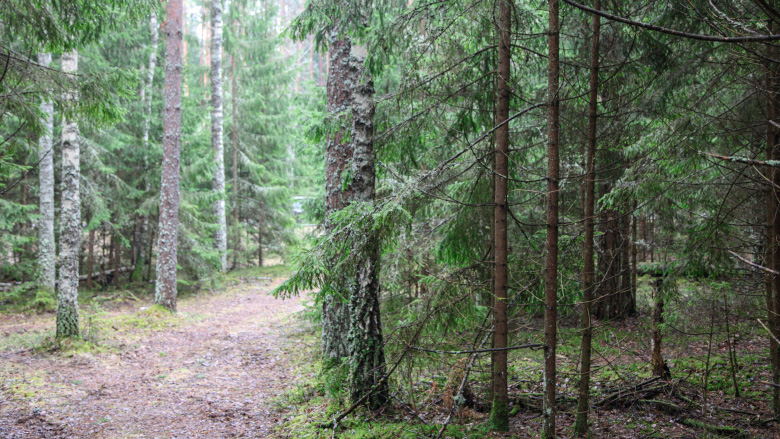
The road to Logoysk is unlike most other roads in Belarus. All the surrounding hills are covered with thick forests, and the views are truly spectacular.
The Belarus Forestry Development Project, implemented with support from the World Bank, is making a significant contribution to improving the sustainability of Belarusian forests. The project has built several innovative forest nurseries, installed fire detection and suppression equipment, and bought special equipment for some forestry enterprises.
They say that, today, a harvester driver is an interesting and high-paying job. So, I'm going to visit Logoysk Forest Enterprise to talk with one, and see if it’s true.
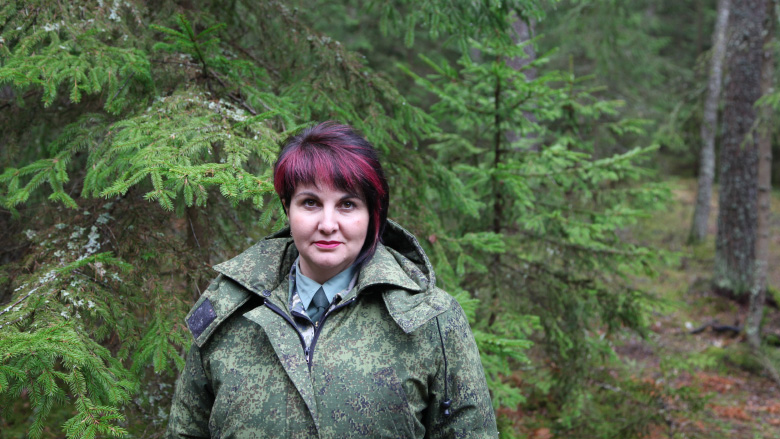
In the city, I meet with Irina Fadeeva, Chief Forest Officer of Logoysk Forest Enterprise. We go to a plot together and she tells me about her organization:
"We have 115,000 hectares. The forestry enterprise includes 11 forestries. We are a forestry establishment, not a logging one, which means that we are focused on forest regeneration. We need to replace forests within 3 years of felling and this involves controlling competing vegetation, ensuring the trees are healthy and have enough light. Our challenge for this year is to regenerate about 500 hectares."
How effective are the new harvesters purchased through the project?
"The new harvesters make it easier and more efficient. The good thing about these vehicles is that they are more maneuverable and help do away with the procedures we had before, like cutting a pathway and making corridors for vehicles to pass through.
The new vehicles fit well between the trees, which means the work is done carefully, i.e., with minimum damage to nature. And they are efficient; just think, a harvester produces 30 to 50 cubic meters of wood, or more than a hectare and a half per shift, depending on a wood cutting area. If translated into manual logging, this harvester replaces 10 to 15 people with chainsaws."
When you bought a new harvester, what happened to the people it replaced? Where did they go? Did you fire them?
"No, they still work at the enterprise. There's always work to do in the woods. Like I said, the more you cut, the more you need to regenerate and take care of the stands. Besides, we still need the chainsaws, because there are cutting areas where we can't put a harvester, like areas for clean-up along the roads."
Do only men become harvester operators?
"A tree feller works with a chainsaw, which means manual logging, while a harvester operator means mechanical logging. We have no female operators in our forest enterprise, but a woman can certainly hold such a position." (Note: The Republican Center for Advanced Training of Forestry Managers and Specialists had a special women's group.)
There is an opinion that forests in Belarus are getting scarcer, that there is nothing left in our forests, and everything has been cut down. Is it true?
"Of course not! In Belarus, forest management is quite sparing. If you compare it with neighboring countries, you can see that we cut down much less. Of course, I understand that villagers used to go for a walk in the woods, then that area was cut down, and people think that everything is being cut down. But this is not the case. We cut down some areas, yes, but we restore what we cut down. It is like an agricultural harvest: there’s a time to create new forests, and a time to cut them down."
---------------------------------------------------------------------------
Irina and I arrive at the plot and walk through the woods for a few minutes. It smells so fresh and full of pine. I see a vehicle ahead that looks like a small tractor, which cuts down a tree in a few seconds, scrapes, and cuts it into pieces. It all looks impressive, and I understand that the words describing the harvester’s maneuverability and efficiency were not exaggerated. The vehicle stops and a thin man in a hard hat comes out. He looks at my surprised face and smiles.
We meet Andrey Luchenovich, a harvester operator.
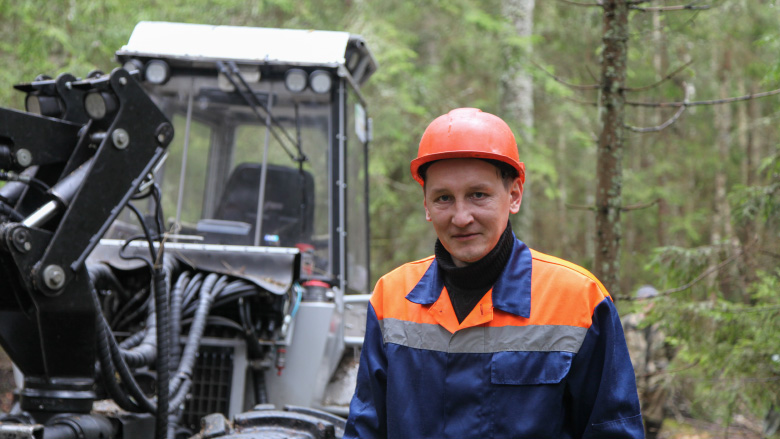
Where are you from and how long have you been working as a harvester operator?
"I've been working since 2011. I'm from Kopyl, but I live here now, not far from Logoysk. At first I went to work in Minsk; as they say, I was after big money but lost my shirt. Then my wife was placed here as a graduate and I decided to work in the woods. I started with a private company, operated a forwarder and collected dumped trees, but then I received training and undertook an internship.
Now I don't want any other job... it is in my nature to work alone. I like my harvester. I can repair it myself, except maybe the engine. I guess you could say it's the perfect job for introverts who like fresh air. But, of course, money plays an important role too."
Do you listen to music when you work?
"I've been listening to e-books lately. I really like it. One can learn a lot of interesting things or just get carried away by a story. Right now, for example, I listen to fiction."
Tell me about your harvester. Was it purchased through the project? How comfortable is it?
"Yes, I know that this harvester was purchased through the project. We have two such harvesters and they are really good. I have tried different vehicles, big and small, American, Belarusian, and Swedish. The Swedish harvesters are quite comfortable and reliable. They have a comfy unit with air conditioning on the roof. It's a great way to work in the summer heat."
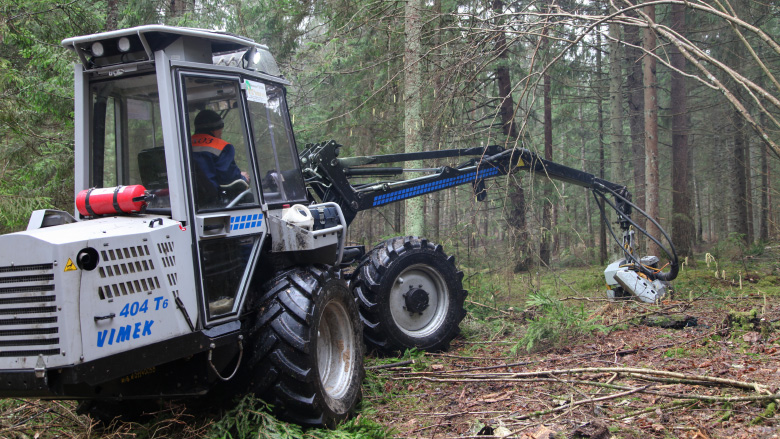
Are there ever any injuries?
"As for injuries, I have had none. But, in general, injuries are possible. For example, branches could fall on my head. That's why I'm wearing a hard hat. It often happens at pine plots. But still, a harvester is a safer working environment than manual logging. It's both comfortable and safe."
What is your schedule?
"I work every three days. Each shift is 12 hours. I start at 8am and work till 8pm."
When your harvester was running, I saw that you cut down a very thin tree. Why cut down thin trees? It seems to make no sense.
"On the contrary, it makes perfect sense. It's planned thinning, meant to shape future woodland. I am cutting down trees that are not viable. It's like a carrot bed: you plant carrots, then you pull up small carrots so that larger ones can grow better. This growing stock will die anyway. But before it dies, we can make useful wood out of it, thanks to this little harvester."
The harvester has a dual benefit: on the one hand, it helps to make space for large trees to grow better by cutting waste, and on the other hand, this waste gives us an additional benefit.
We often cut down dead wood—sick trees that have lost their biological value. They need to be removed because they can infect the other trees. It could be some kind of disease or pests."
And how do you know which tree to cut down, and which not?
"It's all about proper education and experience, of course. During training, I spent a lot of time learning about silvicultural requirements to certain cuts: thinning, corridor cutting, cleaning. Also, due to the technological features of the harvester, I can’t saw larger diameter trees, only 8 to 20 centimeters."
Where did you study?
"I undertook an internship, first in Borisov, then with teachers from Bobruisk. At the end, there was an exam and it wasn't easy at all. The amount of material provided during training is enough to work well, but skills, of course, come with experience. Another important factor is professionalism, the way you feel about your work.
I have high standards. For example, I cut down trees with almost no stumps left, although according to the rules, stump height can be up to one-third of trunk diameter. There are times when I have to change the chain several times a day, but I still make it so that the forwarder that runs behind me and collects trees could pass easily." (Note: the forest enterprise bought two harvester/forwarder sets at once.)
They say it is a high-paying job. Can I ask how much you make?
"Speaking of payment, let’s first of all mention that the harvester helps to do much more than tree fellers do with their chainsaws. It is all about speed: it takes only a few seconds to cut down and scrape a tree when running a harvester. One such harvester can replace 10 and sometimes even up to 15 workers with chainsaws.
Payment largely depends on the forest enterprise that employs you. Different forest enterprises have different situations and offer different salaries. If I work alone, I get about BYN 2,000 in hand. I had a job offer from Russia recently, but I refused. I like it here, I am happy with my salary, and I don’t want to take any risk.
In general, my salary depends on how much wood I harvest. I have a monthly target, and if I exceed it, I get a bonus. But if I can’t hit the target, my salary is lower. The system of incentives helps here.
Now, I'm trying to work hard. I’m planning to buy or build a house soon. I'm on the waiting list for housing in Logoysk."
Do you have a family, children?
"Yes, I have a wife, and a son who will soon be 5 years old. My son certainly likes my job. His favorite toy is a tractor, which he calls a harvester."
The next question, in my opinion, shows whether a person really finds his or her job interesting: Would you be happy if your son became a harvester operator?
"Of course. I'm pushing him toward it. I say I'll teach you everything and then it's up to you. You want to make money, you can do it here. If not... well, you can sweep the streets."
Is there a lot of competition in your business?
"Belarus is quite a small country, and at some point, people learned that harvester operators had a bigger paycheck. Many people started to study at their own expense to get a degree on paper. But they often have no idea of what it’s like, have no love of the forest, they are only eager to make money. First, they treat the vehicle carelessly and then try to cheat and produce greater amounts by cutting down more large trees. What's interesting is that, as a rule, such people do not stay long. It is a hard job, and it should be either done well or not done at all."
It could be tempting to cut down bigger trees and make more money. Is there any kind of control?
"Yes. There is an inspection department that can arrive at any time and it actually arrives frequently. The inspection department can check all my documents (I have a package of documents with me), can take wood samples or check the stumps, although, when I am working, it is sometimes hard to find these stumps (smiling). But the checks really help to identify poor performers."
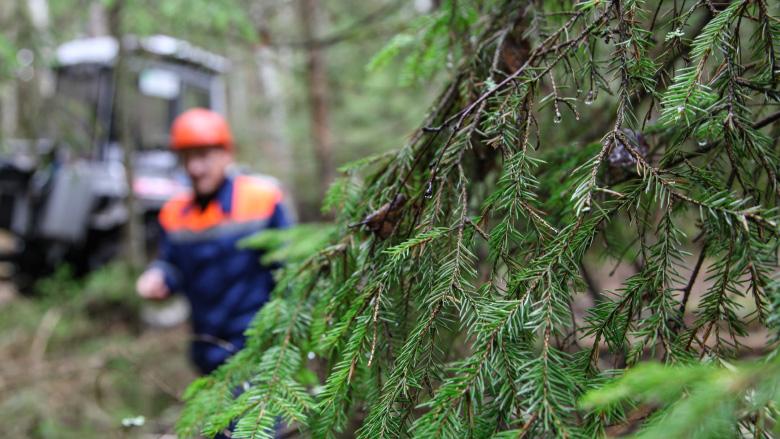
The forest enterprise has two such harvesters and forwarders. If there was a third one, would it have enough work to do?
"Absolutely! We have a lot of forest and a lot of work to do here. Just imagine that two new harvesters replaced almost 30 people with chainsaws, but no one was fired. At the same time, we don’t cut down just for fun. I can't just cut down in any place I like—there is forest management. Each plot has a specification and a lot of documents."
What needs to be done to improve your work, to make it even more efficient?
"We need more such harvesters. And I also know that the main problem of many forest enterprises is the state of the vehicles. To improve this, we need competent and responsible specialists who will treat the equipment as if it is their own. As for training, the situation is improving. The Ministry of Forestry has a special center to train harvester operators and tree fellers. They now have state-of-the-art training hardware and equipment, and students can try real joysticks and simulators. We still have to improve our attitude toward forests and vehicles. This is also very important!"
---------------------------------------------------------------------------
Saying goodbye to Andrey, I turn to Irina and ask her a final question:
Is it prestigious to work in the forest enterprise?
"Working with us is becoming even more prestigious. Just imagine that the forest enterprise is the third-largest taxpayer in the area. We have good specialists coming to us; they try to settle and stay here, in the end. We build homes for our employees and provide good-quality accommodation for all recent graduates.
We try to create further opportunities, for example, we have a health insurance system, employees can get tested, CT-ed, MRI-ed for free, etc. Plus, fairly high salaries and modern equipment to work with: tablets and GPS handhelds. You’ll see why it is interesting and prestigious to work in a forest enterprise. And maybe not just see, maybe you’ll want to join us!"
